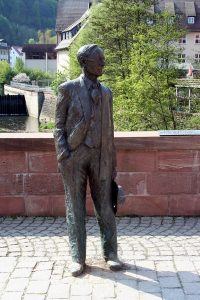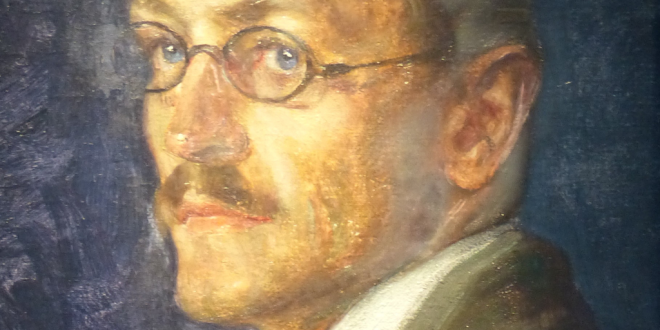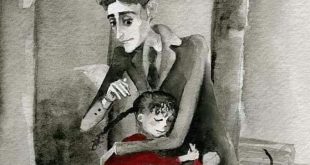Hermann Karl Hesse, a poet, writer, and painter of German descent, created works of art. His best-known works, such as Demian, Steppenwolf, Siddhartha, and The Glass Bead Game, all highlight a character’s search for spirituality, self-awareness, and honesty. He was awarded the Nobel Prize in Literature in 1946.
Hesse was a well-known and influential novelist in the German-speaking world; his wider reputation came considerably later. In this era of fast economic and scientific growth, young Germans eager for a better and more “natural” way of life enthusiastically welcomed Hesse’s first significant work, Peter Camenzind.
Demian left a lasting impression on the generation of First World War veterans who were coming home. With its structured intellectual setting of Castalia and its emphasis on the benefits of meditation and humanism, The Glass Bead Game effectively conveyed Germans’ desire for a new order amidst the chaos of a divided country in the wake of the Second Realm War.
We’d like to provide a few fascinating facts about the well-known novelist of the 20th century who received the Nobel Prize in Literature in 1946.
1. His grandfather had an impact on his reading habits.
Hermann Hesse had unfettered access to his grandfather’s library, and he was urged to read widely. He attended the Goppingen Latin School before enrolling in the Maulbronn Abbey Evangelical Theological Seminary in 1891 at his father’s insistence. He found it difficult to fit in at the seminary and made the decision to leave. Due to this, he experienced a personal crisis, harbored anger toward his parents, and attempted suicide in May 1892.
2. His brother was a role model for him.
The young writer’s initial source of inspiration after defying the family to pursue a musical education was Theo, his half-brother. He was motivated by this example to pursue a career in the arts, but he purposefully decided to pursue writing despite having a lifetime passion for music.
3. He displayed evidence of exceptional intelligence
He shown exceptional intelligence when he was young and possesses a rare aptitude for word play, particularly rhyming. He also showed early signs of depression. He seems to have been depressed for a considerable amount of his life and found great comfort in reading, writing, and music.
4. He made a suicide attempt in 1892.
Thanks to his rebellious temperament, he studied literature at many colleges, but his loud personality caused him issues. He attempted suicide in 1892, which led to his admission to a mental hospital. He came up with a fascinating explanation for the suicide.
This quote from Steppenwolf strikes me: “It is unfair to describe suicides merely as those who actually injure themselves. The uniqueness of the suicide is that, rightly or incorrectly, his ego is seen as an exceedingly perilous, dubious, and doomed germ of nature; he is constantly in danger in his own eyes.
5. He was a bookshop employee.
Following graduation from high school, Hermann Hesse took a job as an apprentice, first at a clock factory and then, starting in October 1895, at a bookshop in Tubingen. His work at the bookstore allowed him to read more widely.
He read works by Friedrich Schiller, Gotthold Lessing Clemens Brentano, Johann Goethe, the German Romantics, and other writers. He so decided to pursue a career as a poet. A consistent income allowed him to become financially independent of his parents by 1898.
6. His marriage life.
Maria Bernoulli and Hermann Hesse were wed in 1904. The couple lived in Gaienhofen on Lake Constance and had three boys there. Around this time, he read a poem by Arthur Schopenhauer and discovered Theosophy, which rekindled his interest in Buddhism.
The marriage suffered from numerous issues before divorcing. The topic of his second marriage, Ruth Wenger, a singer, also ended in divorce.
7. The Hermann Hesse society was established on his 125th birthday.
The Hermann Hesse Society was founded in 2002, the year of his 125th birthday, and the first Calw Hermann Hesse Prize was awarded in 2017. For one year, the award is given to a German-language publication; thereafter, it is given alternately to the finest translator of works from that book.
8. The St. Nicholas Bridge Hesse Monument was constructed in 2002.

9. He made a big impression on Western intellectuals.
Despite the fact that Hesse is probably best recognized for introducing Eastern philosophy to Western writing, he was immensely influenced by Western intellectuals. He claimed that his main Western influences were Nietzsche, Spinoza, Plato, and Schopenhauer.
10. A writing career
Hermann Hesse composed the poem Madonna, which was printed in an Austrian magazine in 1896. The next year, he released Romantic Songs, his debut collection of poems. Eugen Diederichs later released a prose collection titled One Hour After Midnight. The two works were a commercial failure since so few copies of them were sold.
The failure of the works and his mother’s rejection of Romantic Songs left Hesse in a state of great shock. Positive reviews of his book Posthumous Writing and Poems of Hermann Lauscher, which Samuel Fischer published in 1901, launched his writing career. After this, Hesse’s debut book, Peter Camenzind, became popular.
Hesse has received varying degrees of attention from academics and critics of literature. Despite the criticism that his work is childish and unsophisticated, many writers have been influenced by it.
Thanks for reading… <3
Source: discoverwalks.com
 MENTPSYCH Meet Your Self
MENTPSYCH Meet Your Self




